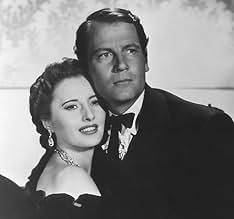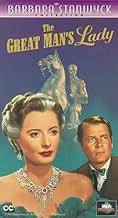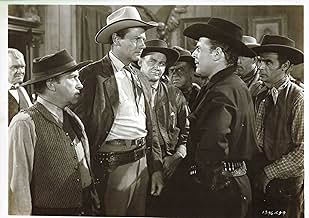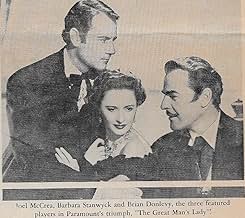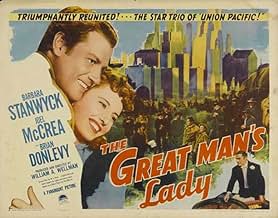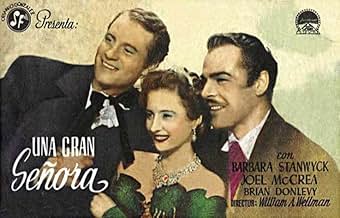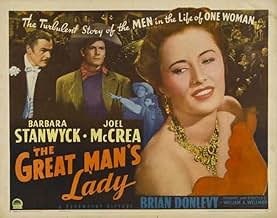अपनी भाषा में प्लॉट जोड़ेंA 100-year-old pioneer woman tells her story in flashbacks.A 100-year-old pioneer woman tells her story in flashbacks.A 100-year-old pioneer woman tells her story in flashbacks.
- पुरस्कार
- कुल 2 जीत
K.T. Stevens
- Girl Biographer
- (as Katharine Stevens)
Irving Bacon
- Parson
- (बिना क्रेडिट के)
Hank Bell
- Man #1 - Hoyt City
- (बिना क्रेडिट के)
Monte Blue
- Man #2 - Hoyt City
- (बिना क्रेडिट के)
फ़ीचर्ड समीक्षाएं
10SHAWFAN
Such undeserved condescension on the part of most of your reviewers! I thought it was an absorbing romantic drama in which Stanwyck was at her very best. As she turned from youthful sparkly-eyed amused flirt in her first scenes with McCrea into the mature more gray-haired woman seriously urging him to do his political best for those whom he represented, her virtuosity as an actress of transformations came greatly to the fore. It was a pleasure to respond to her in her various moods of youthful love, a stunned mother's loss of her two babies, her vigorous denunciation of her father in his unconscionable request of her, and finally the resignation of old age in which she at last destroys the long-lived marriage certificate she's been carrying around through most of the story.
McCrea was also very good, especially in the scene in which he confesses himself guilty of the same kind of corruption so rife in the American West at that railroad-building time.
The story seemed to echo the true events of The Ballad of Baby Doe (opera) in its background of silver mining and marital troubles; and it certainly resembled Edna Ferber-Abby Mann's Cimarron in retelling the story of a marriage in which the husband spends years on the road away from his wife.
The 19th-century flooding in Sacramento was certainly up to date given the similar events happening in that city in our own times as well.
A great movie. Pay no attention to those detractors.
McCrea was also very good, especially in the scene in which he confesses himself guilty of the same kind of corruption so rife in the American West at that railroad-building time.
The story seemed to echo the true events of The Ballad of Baby Doe (opera) in its background of silver mining and marital troubles; and it certainly resembled Edna Ferber-Abby Mann's Cimarron in retelling the story of a marriage in which the husband spends years on the road away from his wife.
The 19th-century flooding in Sacramento was certainly up to date given the similar events happening in that city in our own times as well.
A great movie. Pay no attention to those detractors.
Unfortunately, whatever production values this film contains are generally spoiled by the passage of time and fortunate changes in perspective. For those of us watching now are happily forewarned in the narrator's introduction to the film in which it is not only explicit as to the woman character's subordinate position to her "great man" but also at least implicit as to the role of any woman in the life of her "great man." Of the many "flash-back" films where the character re-hashes their past, this is certainly melodramatic in its acting and characterizations. The action does not seem compelling to watch, as if one could fast-forward to get to the punch line, which does not really satisfy - the principal male character's life is summed up in such high regard as to make one wonder if the viewer had just seen the same film! One has to wonder how female audience members felt about the general message (such as it is) of this film when it opened in theatres, although Ms. Stanwyck most likely held her own in her stubbornness by standards of the time.
Fake history, played for bathos. On Founders Day in the thriving metropolis of Hoyt City, eager-beaver reporters swarm the home of a 109-year old woman, reputedly once married to founding father Ethan Hoyt; she's surely got a tall tale to tell, beginning when she was just a teenager in 1848 Philadelphia. Barbara Stanwyck begs, borrows, and barters to finance the future of idealistic husband Joel McCrea, who owns a great stretch of land with nothing on it but a shack. The narrative skitters over such crucial story-elements as railroad access, livestock, a water supply, financial aid--all for the sake of marital melodrama. Brian Donlevy, as a shady gambler who has immediate eyes for Stanwyck, does what he can with a character conceived as an afterthought (he plugs up the holes left behind by a screenplay spanning many years' time); Stanwyck and McCrea fare a bit better, though this story is seldom credible, and is often downright loopy. Production is handsome enough, and the intentions behind the film are apparently heartfelt, but there isn't a surprise in its entire 91 minutes. ** from ****
When the statue of the founder of Hoyt City, Ethan Hoyt (Joel McCrea) is dedicated, the sensationalist reporters and a biographer (Katharine Stevens) head to the house of the one hundred year-old Hannah Sempler (Barbara Stanwyck), where Ethan died, to know the relationship between them. Ms. Hannah sends them all out but the lady. Then she tells her life since she was a teenager and felt in love with the pioneer Ethan.
In 1848, in Philadelphia, Ethan dreams on building Hoyt City, but he needs financiers and influent people to change the route of the railroad. Hannah decides to leave her upper-class father and marries with Ethan. Eight years later, she meets the gambler Steely Edwards (Brian Donlevy) and they become close friends. When Ethan discovers silver, Steely lends money to Hannah with the condition that she does not go to the mines with Ethan. Along the years, Ethan becomes rich and far from Hannah that he believes had died in a flood. Years later, they meet each other again in Hoyt City but their love is doomed since Ethan has raised a family of his own.
"The Great Man's Lady" is a classic with some of my favorite directors (William A. Wellman), actresses (Barbara Stanwyck) and actors (Joel McCrea and Brian Donlevy); and haunting music score by Victor Young. Unfortunately the story is a confused romance with a not well-explained triangle of love. I did not understand the quote "spring never comes again", since spring returns every year. My vote is six.
Title (Brazil): "Até Que a Morte nos Separe" ("Till Death Do Us Apart")
In 1848, in Philadelphia, Ethan dreams on building Hoyt City, but he needs financiers and influent people to change the route of the railroad. Hannah decides to leave her upper-class father and marries with Ethan. Eight years later, she meets the gambler Steely Edwards (Brian Donlevy) and they become close friends. When Ethan discovers silver, Steely lends money to Hannah with the condition that she does not go to the mines with Ethan. Along the years, Ethan becomes rich and far from Hannah that he believes had died in a flood. Years later, they meet each other again in Hoyt City but their love is doomed since Ethan has raised a family of his own.
"The Great Man's Lady" is a classic with some of my favorite directors (William A. Wellman), actresses (Barbara Stanwyck) and actors (Joel McCrea and Brian Donlevy); and haunting music score by Victor Young. Unfortunately the story is a confused romance with a not well-explained triangle of love. I did not understand the quote "spring never comes again", since spring returns every year. My vote is six.
Title (Brazil): "Até Que a Morte nos Separe" ("Till Death Do Us Apart")
Unfortunately I found this VHS at Video Vault and took it home. All I can say is that even with William A. Wellman directing, Joel McCrea and Barbara Stanwyck acting, Victor Young doing the music and Edith Head the costumes --- each of these people have made pictures ten times better.
Walt Disney's Thumper taught me years ago, "If you can't say nuthin' nice, don't say nuthin' at all." Therefore, I'll note that Great Man's Lady was better than "Shawshank Redemption" which ranks #2 of all time on this website, better than "Order of the Phoenix" whereby Warner's tossed the 750 page story and made a 2 1/2 hour movie with NO story. Please see Wellman's AAA+ "Little Caesar" or McCrea's "4 Faces West" and skip this one.
Walt Disney's Thumper taught me years ago, "If you can't say nuthin' nice, don't say nuthin' at all." Therefore, I'll note that Great Man's Lady was better than "Shawshank Redemption" which ranks #2 of all time on this website, better than "Order of the Phoenix" whereby Warner's tossed the 750 page story and made a 2 1/2 hour movie with NO story. Please see Wellman's AAA+ "Little Caesar" or McCrea's "4 Faces West" and skip this one.
क्या आपको पता है
- ट्रिवियाOne of over 700 Paramount productions, filmed between 1929-49, that were sold to MCA/Universal in 1958 for television distribution, and have been owned and controlled by Universal ever since. Its initial television broadcasts took place in Los Angeles Thursday 8 January 1959 on KNXT (Channel 2) and in St. Louis Friday 9 January 1959 on KMOX (Channel 4). In Seattle, it first aired 24 July 1959 on KIRO (Channel 7), in Phoenix 8 August 1959 on KVAR (Channel 12), in Milwaukee 27 September 1959 on WITI (Channel 6), in Pittsburgh 26 October on KDKA (Channel 2), in Detroit 29 October 1959 on WJBK (Channel 2), in Toledo 19 December 1959 on WTOL (Channel 11), in Omaha 22 December 1959 on KETV (Channel 7), in Grand Rapids 27 December 1959 on WOOD (Channel 8), in Chicago 29 December 1959 on WBBM (Channel 2), in New York City 26 March 1960 on WCBS (Channel 2), in Minneapolis 9 November 1960 on WTCN (Channel 11), in Philadelphia 22 December 1962 on WCAU (Channel 10), and in San Francisco 3 February 1963 on KPIX (Channel 5). It was released on DVD 27 April 2010 as one of six titles in Universal's Barbara Stanwyck Collection and on 13 July 2015 as a single as part of the Universal Vault Series; since that time, it's also enjoyed occasional airings on Turner Classic Movies.
- गूफ़When the Hoyts stand at the sight of their future city, they're at the foot of a hill, but moments later they're on top of a hill.
- कनेक्शनFeatured in Biography: Barbara Stanwyck: Straight Down the Line (1997)
- साउंडट्रैकUnfinished Symphony
("Symphony 8 in B Major") (uncredited)
Composed by Franz Schubert (begun 1822)
Heard on soundtrack during Janet and Ethan's farewell and under end title
टॉप पसंद
रेटिंग देने के लिए साइन-इन करें और वैयक्तिकृत सुझावों के लिए वॉचलिस्ट करें
- How long is The Great Man's Lady?Alexa द्वारा संचालित
विवरण
- चलने की अवधि1 घंटा 30 मिनट
- रंग
- पक्ष अनुपात
- 1.37 : 1
इस पेज में योगदान दें
किसी बदलाव का सुझाव दें या अनुपलब्ध कॉन्टेंट जोड़ें


